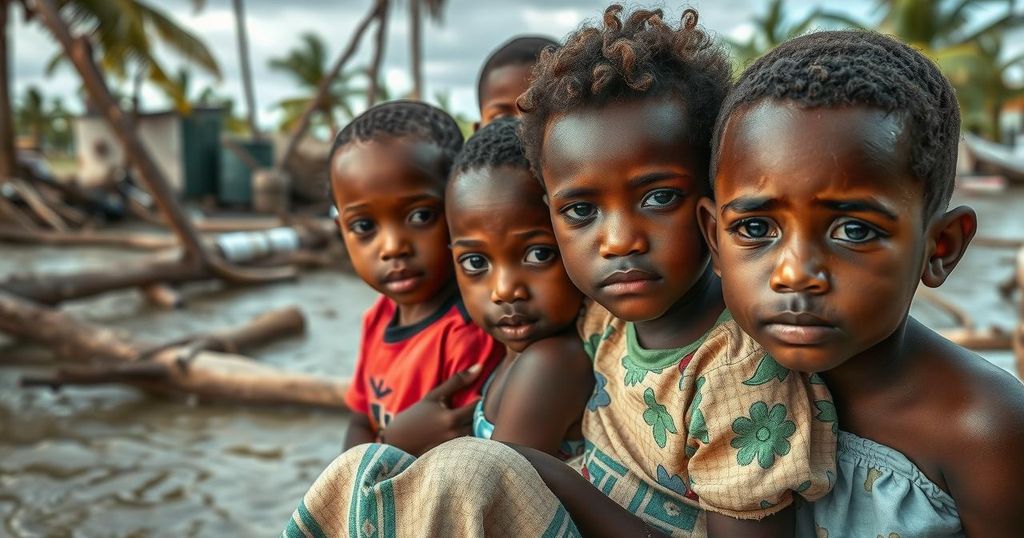Cyclone Chido Devastates Northern Mozambique, Impacting 90,000 Children

Tropical Cyclone Chido has impacted approximately 90,000 children in northern Mozambique, destroying thousands of homes and classrooms while exacerbating ongoing health crises. Overall, around 174,000 individuals are affected, with urgent humanitarian assistance needed across the region as UN agencies mobilize to provide relief amid significant challenges.
Tropical Cyclone Chido recently struck northern Mozambique, inflicting severe damage on communities within Cabo Delgado province. The storm has been reported to have destroyed or damaged over 35,000 homes and displaced thousands of families, with UNICEF estimating that approximately 90,000 children have been severely affected. Assessment reports indicate that at least 174,000 individuals are impacted, a number likely to rise as evaluations continue.
The cyclone wreaked havoc beyond residential structures, obliterating at least 186,000 classrooms and affecting 20 health facilities. The storm made landfall near the city of Pemba, causing significant destruction to civilian infrastructure and disrupting electricity and communication services. Mary Louise Eagleton, the UNICEF Representative in Mozambique, highlighted, “Mozambique is considered one of the most affected countries in the world by climate change and children were already experiencing several life-threatening emergencies before Cyclone Chido, including conflict, drought, and disease outbreaks.”
Cabo Delgado has suffered from extended conflict for over seven years, displacing approximately 1.3 million individuals, predominantly women and children. The arrival of Cyclone Chido has exacerbated the ongoing crises, removing what little stability these families had begun to rebuild. The cyclone’s impact surpassed Cabo Delgado, reaching Nampula and Niassa provinces, where it has left over 25,000 families without electricity and damaged essential water facilities.
In regions already grappling with a cholera outbreak, UNICEF expressed concern that the cyclone’s devastation could further escalate health risks. The World Health Organization has deployed experts to assist in health assessments, aiming to address immediate needs in Cabo Delgado and Nampula provinces. In a prompt response, the UN Refugee Agency (UNHCR) provided emergency relief to over 2,600 people in Pemba, distributing vital items including blankets and shelters.
As per preliminary assessments, it is estimated that around 190,000 individuals urgently require humanitarian assistance, with reports of 33 schools affected and nearly 10,000 homes destroyed. UNHCR spokesperson Eujin Byun underscored the uncertainty regarding the full extent of the damage in rural areas, characterizing the situation as dire. The UN Secretary-General António Guterres announced via X that UN teams are engaged in providing emergency assistance while standing prepared for additional support.
Recent evaluations from the UN’s aid coordination office indicate that resource constraints are hindering response efforts. The Emergency Relief Coordinator has allocated $4 million to support early humanitarian responses in Mozambique. In a broader context, the World Food Programme anticipates that nearly 3.3 million people in Mozambique will face crisis or higher levels of food insecurity in the coming year, vowing to intensify assistance to cyclone-affected communities.
Furthermore, Cyclone Chido inflicted substantial damage on the French overseas territory of Mayotte, resulting in fatalities and infrastructure destruction. Its effects extended to southern Malawi, where strong winds and rainfall also caused significant damage. UNHCR is closely monitoring the evolving situation and collaborating with local agencies to respond effectively.
Cyclone Chido has become a significant humanitarian crisis in Mozambique, affecting tens of thousands, particularly children, already vulnerable due to a history of conflict, drought, and disease. The disaster underscores the impact of climate change on the region, with Mozambique being one of the most affected nations. The UN and its associated organizations are mobilizing resources to tackle immediate humanitarian needs, emphasizing the urgency and scale of the situation as they strive to provide support in the wake of destruction.
In conclusion, Cyclone Chido has inflicted widespread devastation across northern Mozambique, particularly affecting children and resulting in substantial loss of infrastructure. Humanitarian organizations, led by UNICEF and UNHCR, are responding to the urgent needs of the affected population, yet face significant challenges due to resource shortages. The continued escalation of the crisis highlights the urgent requirement for international support to aid in recovery efforts, especially in areas already suffering from previous emergencies.
Original Source: news.un.org








